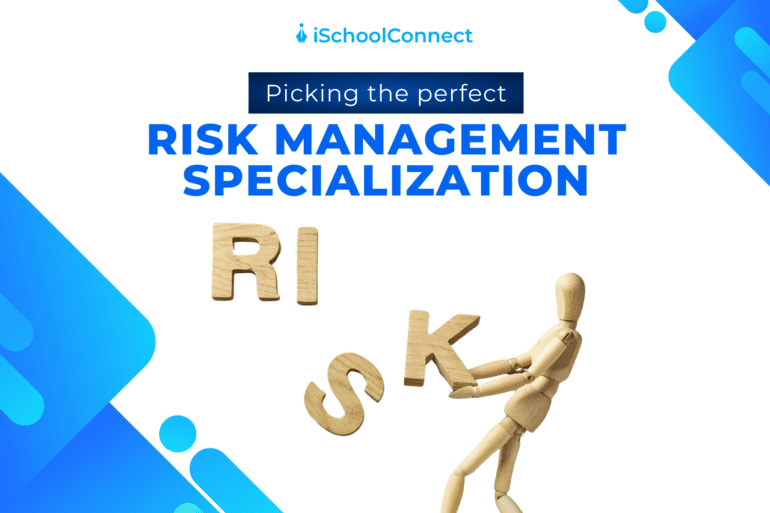Table of Contents
Role of competent risk management in the corporate landscape
It is impossible to overestimate the significance of competent risk management in the ever-changing corporate climate of today when uncertainty is the one constant. The demand for experts in risk management is rising as businesses deal with a variety of hazards that could affect their operations, standing, and capacity to make money. Enrolling in a Risk Management courses can equip you with the necessary information and abilities to traverse this intricate sector, but with so many alternatives available, picking the appropriate specialization becomes essential.
Understanding risk management
Before getting into the specifics of choosing a specialization, let’s first understand the fundamentals of risk management. Risk management is the process of identifying, assessing, and mitigating risks to achieve business objectives. It involves a systematic approach to find out any probable issues and develop strategies to address them effectively.
Types of risk management

Risk management encompasses various categories, each requiring specialized knowledge. These include-
- Financial risk management- It focuses on managing risks related to financial markets, currency fluctuations, and investment portfolios.
- Operational risk management- Involves identifying and mitigating risks associated with day-to-day operations, such as process failures, human errors, and technology disruptions.
- Enterprise Risk Management (ERM)- Takes a holistic approach, considering risks across all aspects of an organization, including strategic, financial, and operational.
- Cybersecurity risk management- Addresses risks related to information security, data breaches, and cyber threats in the digital age.
Importance of risk management
Effective risk management is essential for businesses to thrive in a volatile world. It provides a proactive approach to challenges, ensuring that organizations can anticipate and respond to potential disruptions. Regulatory bodies often require companies to have robust risk management practices in place, further emphasizing its significance.
Careers and pay scale in risk management
A career in risk management can be both rewarding and intellectually stimulating. Professionals in this field often find employment in various industries, including finance, healthcare, and technology. The roles may range from risk analysts and managers to chief risk officers. The pay scale for risk management professionals is competitive, with salaries varying based on factors such as experience, specialization, and the industry.
| Designation | Salary |
| Risk analyst | Entry Level- $50,000 – $70,000Mid-Career- $70,000 – $90,000Experienced- $90,000 – $120,000 |
| Risk manager | Entry Level- $60,000 – $80,000Mid-Career- $80,000 – $110,000Experienced- $110,000 – $150,000 |
| Chief Risk Officer (CRO) | Mid-career- $120,000 – $180,000Experienced- $180,000 – $300,000+In larger corporations, CRO salaries can go even higher, depending on the industry and the company’s size. |
| Credit Risk Analyst | Entry Level- $50,000 – $70,000Mid-Career- $70,000 – $90,000Experienced- $90,000 – $120,000 |
| Operational Risk Manager- | Entry Level- $70,000 – $90,000Mid-Career- $90,000 – $120,000Experienced- $120,000 – $160,000 |
Choosing the right specialization
An important choice that will influence a student’s professional path is choosing the appropriate specialization. Here are some key factors to consider-
- Personal interest and strengths- Identify your interests and strengths within the broader field of risk management. If you enjoy analyzing financial markets, financial risk management might be a suitable choice. If you are tech-savvy and interested in cybersecurity, it could be a profitable specialization.
- Industry trends- Stay informed about current trends and emerging issues in different industries. This will help you align your specialization with the areas of growing demand. For instance, as technology continues to evolve, cybersecurity risk management expertise is increasingly in demand.
- Skills development- Assess the skills required for each specialization and evaluate your existing skill set. Choose a specialization that not only aligns with your interests but also provides an opportunity to develop new skills that are in demand in the job market.
- Networking opportunities- Consider the networking opportunities associated with each specialization. Certain industries may have specific conferences, events, or professional associations that can enhance your professional network and open doors to new opportunities.
Colleges to study Risk Management course
Selecting the right educational institution is crucial in ensuring the quality of your risk management education. Look for accredited institutions with faculty experienced in the field and a curriculum that reflects the latest industry trends. Some renowned institutions offering Risk Management courses include-
- Harvard University- A comprehensive program covering various aspects of risk management is available at Harvard University. It mainly focuses on strategic risk.
- University of Chicago – Booth School of Business- Known for its financial risk management program, the University of Chicago – Booth School of Business emphasizes quantitative approaches to risk assessment.
- Columbia Business School- A Master of Science in Enterprise Risk Management course is offered at Columbia Business School. It provides a holistic view of risk across organizations.
- Massachusetts Institute of Technology (MIT)- Recognized for its cutting-edge research, MIT offers programs that integrate technology and risk management.
Key takeaways
- Constant change and uncertainty affect the corporate landscape, making competent risk management indispensable for businesses.
- Aligning your specialization with areas of growing demand improves your career prospects and opens doors to new opportunities.
- Professionals in this field find employment across various industries, with roles ranging from risk analysts to chief risk officers.
Did you enjoy reading this blog? Share your thoughts and experiences in the comments section below. For more information on international courses, career guidance, or any related queries, click here.
Liked this blog? Read next: Radiography course | What to expect after completing the program
FAQs
Q1. Are there internship opportunities in risk management?
Ans- Many organizations offer internship programs in risk management. Internships provide hands-on experience that allows you to apply theoretical knowledge in real-world scenarios. Securing an internship is an excellent way to gain a practical understanding of the field and enhance your resume.
Q2. How often does risk management training need to be updated?
Ans- Risk management practices evolve with industry trends and emerging threats. It’s advisable to stay updated through continuous learning, professional development programs, and attending relevant conferences. Regularly updating your skills ensures you remain well-informed about the latest developments in risk management.
Q3. How do I get into the risk management field with no experience?
Ans- Get a bachelor’s degree, look for positions involving risk management responsibilities, and obtain a risk management professional certification. By following these tips, you can get a job in the risk management sector without experience.






